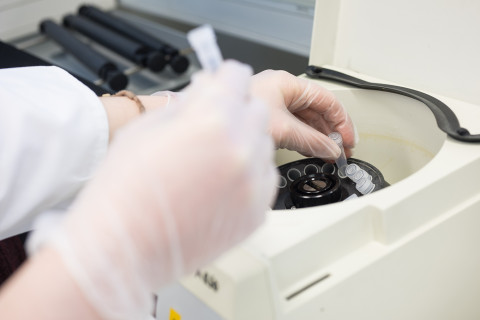A gene mutation commonly associated with frontotemporal dementia can lead to impaired protein degradation and to the accumulation of proteins in neurons, a new study published in Cells shows.
Hexanucleotide repeat expansion in the C9orf72 gene is the most common cause of frontotemporal dementia and amyotrophic lateral sclerosis, ALS. It is exceptionally common in Finnish patients and underlies approximately half of all cases. The molecular mechanisms of the C9orf72 repeat expansion resulting in neurodegeneration are currently under intensive study. Research in the recent years has identified three main mechanisms at the molecular level. First of all, the expanded repeat is transcribed and translated to abnormal RNA and protein species, which accumulate in the neurons and cause toxicity. In addition, the repeat expansion results in C9orf72 haploinsufficiency, leading to an approximately 50% decrease in the levels of the normal C9orf72 mRNA and proteins in the patients.
The function of the normal C9orf72 proteins especially in neurons remains poorly known. There is evidence that they may regulate vesicular trafficking and the autophagosomal pathway in cells. Thus, if the levels of the C9orf72 proteins are decreased due to the haploinsufficiency caused by the repeat expansion, such cellular functions may be disturbed. In general, dysfunction of the autophagy- and proteasome-mediated protein degradation has previously been suggested to associate with the pathogenesis of neurodegenerative diseases and lead to the accumulation and aggregation of abnormal and damaged proteins and cellular organelles in the nervous system, which could cause neurodegeneration.
C9orf72 regulates autophagy
A new study from the University of Eastern Finland reports that lower levels of C9orf72 proteins in neuronal cells lead to dysfunction in the autophagosomal degradation pathway. The researchers used a neuronal cell line and cultured primary neurons from mouse brain and overexpression or knockdown, to mimic the C9orf72 haploinsufficiency, of the C9orf72 proteins to investigate their role in the proteasomal and autophagosomal degradation pathways.
They observed that knocking down the C9orf72 proteins led to a significantly poorer activation of the autophagosomal pathway and decreased formation of autophagosomal vesicles. Concomitantly, the degradation of p62, a protein known to normally undergo autophagosomal degradation, was impaired. Even though further studies are needed, the current results suggest that the haploinsufficiency taking place in patients carrying the C9orf72 hexanucleotide repeat expansion might lead to impaired autophagosomal activity and therefore to the accumulation of harmful proteins in neurons.
C9orf72 protein levels are also regulated by autophagosomal and proteasomal pathways
There is no previous knowledge about the regulatory mechanisms of the C9orf72 proteins themselves. The present study revealed that the C9orf72 proteins may undergo degradation via proteasomal or autophagosomal pathways or both depending on the cell type. It was observed that especially in primary neurons, both pathways can probably be used to ensure proper regulation of the C9orf72 protein levels in neurons.
The study was performed in the research group of Research Director Annakaisa Haapasalo at the A.I. Virtanen Institute for Molecular Sciences, UEF. It is part of a larger translational research programme on frontotemporal dementia aiming at uncovering the molecular mechanisms of the disease and identifying novel candidate targets for biomarker and therapeutic development. The research group is also part of the Finnish FinFTD research network on frontotemporal dementia.
For further information, please contact:
Early Stage Researcher Stina Leskelä, stina.leskela(at)uef.fi
Research Director Annakaisa Haapasalo, annakaisa.haapasalo(at)uef.fi
Original article (open access):
Leskelä, S.; Huber, N.; Rostalski, H.; Natunen, T.; Remes, A.M.; Takalo, M.; Hiltunen, M.; Haapasalo, A. C9orf72 Proteins Regulate Autophagy and Undergo Autophagosomal or Proteasomal Degradation in a Cell Type-Dependent Manner. Cells 2019, 8(10), 1233; https://doi.org/10.3390/cells8101233



